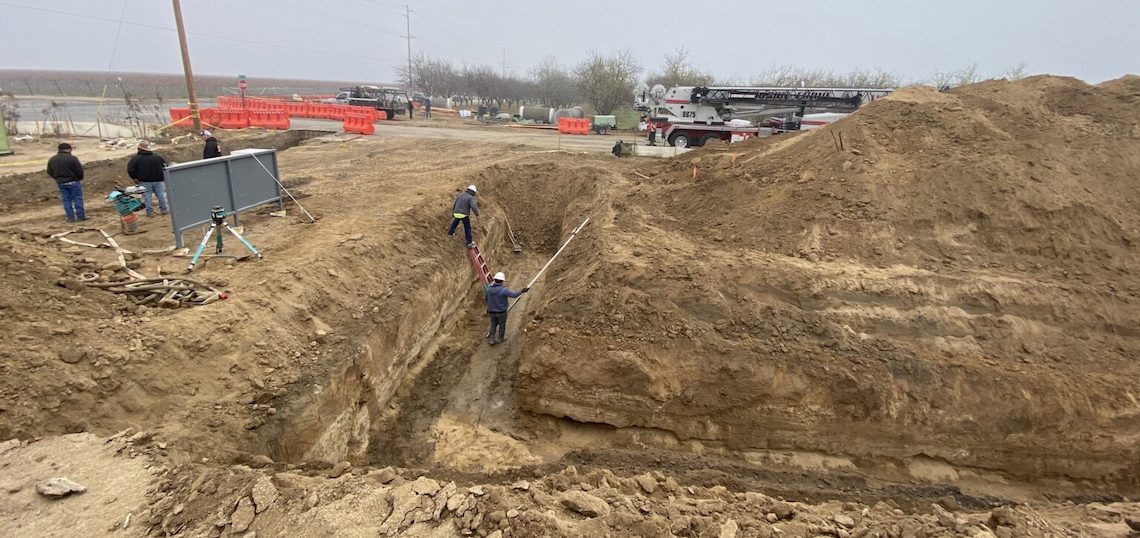
Workers dig trenches in a water recharge basin being constructed for the Delano-Earlimart Irrigation District in this Jan. 2021 photo. Lois Henry / SJV Water
Written by Lois Henry with SJV Water
Growers in a chunk of land sandwiched between Highway 43 and Earlimart in the south valley learned earlier this week they are being booted out of the groundwater sustainability agency they had hoped would help solve their overdraft issues.
The Delano-Earlimart Irrigation District Groundwater Sustainability Agency (GSA) board voted to terminate its oversight of what’s known as the “western management area,” about 7,500 acres just west of its boundaries. That area has no surface water and is almost totally reliant on groundwater, making it a challenge to bring into compliance with the Sustainable Groundwater Management Act.
“The continued inclusion of the Management Area in the DEID GSA is no longer consistent with the successful sustainable management of other lands within the DEID GSA,” read a statement by the Delano-Earlimart GSA on June 28. “As such, the DEID GSA is terminating its (memorandum of understanding.)”
Now, the area is a “hot potato” in the Tule subbasin in southern Tulare County, according to Steve Jackson, who is consulting with the loosely knit group of growers who farm in that area.
“It’s unfortunate but not unexpected,” Jackson said of the move by the Delano-Earlimart GSA.
He said landowners now have two options: Form their own GSA and whip up a new groundwater plan, which there’s no time for; or hope the nearby Pixley or Tri-County GSAs picks them up.
“It’s gotten pretty political,” Jackson said. “But the area has to be covered by a GSA. The Tule subbasin can’t leave this as a gap.”

The move comes just six months before the Tule subbasin is scheduled for its first hearing before the state Water Resources Control Board to determine if it should be put into “probationary status” under SGMA, which mandates aquifers in overdrafted areas be brought into balance by 2040.
Probationary status means the state, not locals, would draw up an interim groundwater plan, set pumping allowances and charge steep fees for every acre foot pumped.
The Tule subbasin, along with five other valley subbasins, face state action because their groundwater plans were deemed inadequate.
The other subbasins include: Kern; Tulare Lake, which covers most of Kings County; Kaweah, which covers northern Tulare County; Delta-Mendota, which stretches up the western side of the valley from Fresno to Stanislaus counties; and the Chowchilla subbasin, which covers a chunk of Madera County.
In the Tule subbasin, regulators determined that water tables were set too low to protect all water users, including drinking water wells for small communities. The state also found the plan didn’t do enough to address subsidence, or land sinking, a major problem in the region.
There are seven GSAs in the Tule subbasin. Even though each wrote its own groundwater plan, SGMA mandates they must be coordinated.
The Delano-Earlimart GSA has already begun reworking its plan in anticipation of the state hearing set for January, said director Eric R. Quinley.
Delano-Earlimart’s revision sets water tables at a higher level to protect all water users, including the Earlimart and Richgrove disadvantaged communities, which are within its boundaries.
“We’re a net recharger,” Quinley said, adding that the district doesn’t have an overdraft thanks largely to its focus on socking away water in wet years.
By early next year the district will have built enough water recharge basins to put 13,000 acre feet per month back in the aquifer during wet years. The district began that effort years ago recognizing the need to prepare for climate change and in order to protect vital infrastructure, he said.
That includes the Friant-Kern Canal, which has sunk over a 33-mile section because excessive groundwater pumping north of Delano-Earlimart caused the ground to collapse.
Quinley said the Delano-Earlimart GSA’s decision to terminate its oversight of the 7,500 acres to its west, which is overdrafted, was done to allow growers in those lands to “have their own representation.”
Jackson noted this is just the latest move by a large number of groundwater managers looking for a carve out.
Indeed, in Kern County, multiple water districts began bailing out of the Kern Groundwater Authority last year to form their own GSAs after the Semitropic Water Storage District refused to alter its proposed groundwater levels even after an initial state evaluation flagged water levels as problematic.
The sprawling district in northwest Kern County set its thresholds an average 189 feet below the current water table, meaning its farmers could, theoretically, pump the aquifer down that much more before the district would take action. In some cases Semitropic’s levels were hundreds of feet lower than those of its neighbors making.
Just last month, Rosedale-Rio Bravo Water Storage District, which shares a border with Semitropic, notified the Kern Groundwater Authority it, also, was pulling out.
Some of those fleeing districts are likely hoping to take advantage of Water Code Section 10735.2(e), which states “The (state Water) board shall exclude from probationary status any portion of a basin for which a groundwater sustainability agency demonstrates compliance with the sustainability goal.”
In water circles, it’s known as the “good guy clause,” meaning groundwater agencies working toward sustainability per all the requirements of SGMA might not be put on probation with the rest of a subbasin.
SJV Water is a nonprofit, independent online news publication covering water in the San Joaquin Valley. Lois Henry is the CEO/Editor of SJV Water. She can be reached at lois.henry@sjvwater.org. The website is www.sjvwater.org.







